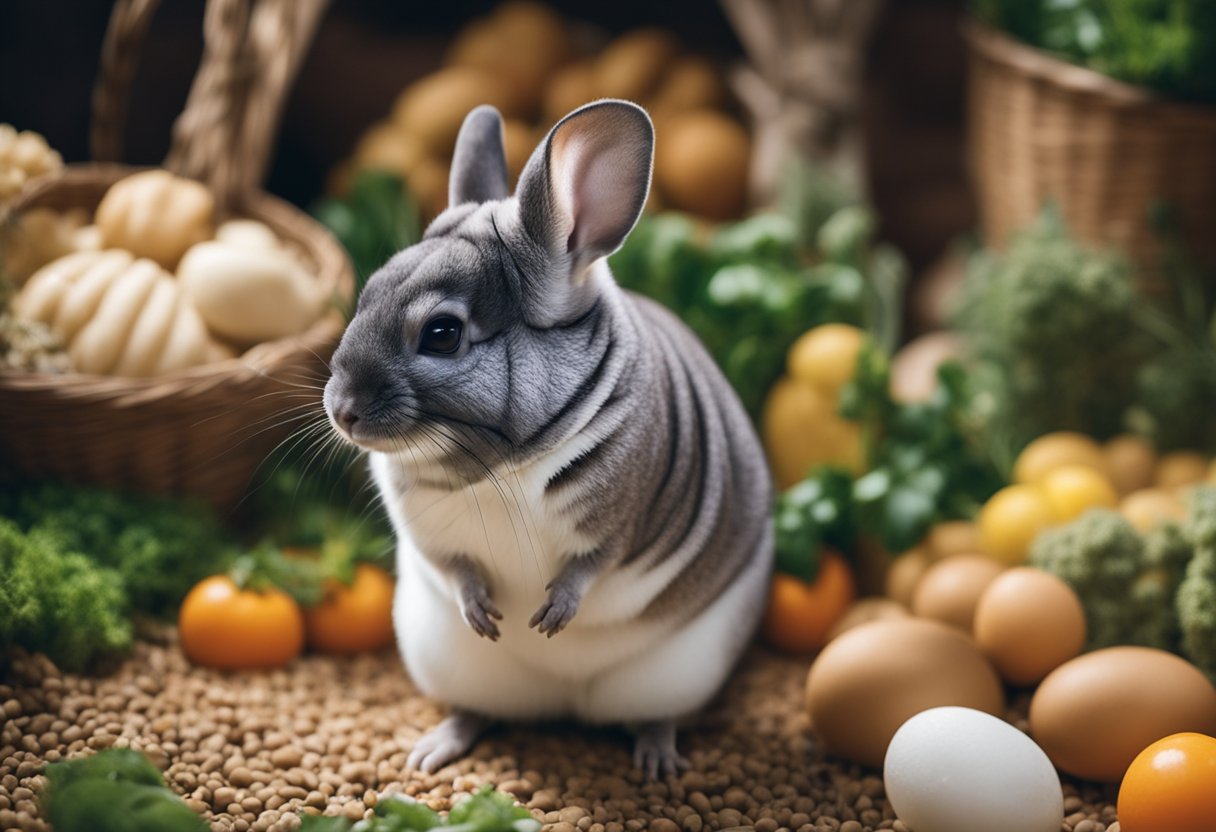Can Chinchillas Eat Rabbit Food? Chinchillas have unique dietary needs that set them apart from other small pets. If you’re considering feeding your chinchilla rabbit pellets, it’s essential to know the potential risks involved. In general, it is best to avoid feeding rabbit food to chinchillas due to their different nutritional requirements. Understanding what your chinchilla needs can help you provide a healthier and happier life for your pet.

Knowing the right type of food for chinchillas can prevent various health issues. Rabbit food can lead to digestive problems like bloat and diarrhea, which can be serious for these sensitive animals. This article will clarify why chinchillas should have a specialized diet and what you should feed them instead.
With the right information, you can ensure that your chinchilla thrives on the correct diet. You’ll find the answers to your questions about chinchilla nutrition throughout this article, helping you make informed decisions for your furry friend.
Key Takeaways
- Chinchillas have specific dietary needs that differ from rabbits.
- Feeding rabbit food can cause health issues for chinchillas.
- It’s important to provide a diet that meets your chinchilla’s nutritional requirements.
Understanding Chinchillas’ Nutritional Needs

Chinchillas have specific dietary requirements that are crucial for their health. Knowing what they need will help you provide the right food for your pet. There are also risks associated with feeding inappropriate diets, which can lead to health problems.
Specific Dietary Requirements
Chinchillas are herbivores with specialized diets. Their main food should be high-quality hay, such as timothy or orchard grass. Hay provides essential fiber, which helps maintain gut health.
In addition to hay, chinchillas benefit from pellets made specifically for them. These pellets contain balanced nutrients. You should avoid rabbit pellets, as they do not meet chinchillas’ unique needs. The right diet helps prevent obesity and dental issues.
Treats can include small amounts of dried fruit or vegetables. Always introduce new foods gradually. Monitor your chinchilla for any signs of digestive issues, as their systems are sensitive.
Risks of Inappropriate Diet
Feeding chinchillas the wrong food can result in serious health problems. Rabbit food, while tempting, lacks vital nutrients for chinchillas. This can lead to deficiencies over time.
High sugar content in some treats can cause obesity and dental decay. It is important to limit these foods to prevent health issues.
Unexpected changes in diet can also lead to gastrointestinal distress. If you must introduce something new, do it slowly and in small amounts. Regularly check your pet’s health to catch any potential problems early.
Comparing Rabbit Food to Chinchilla Diet

You need to understand the differences between rabbit food and a proper chinchilla diet. The ingredients, potential health risks, and necessary resources play a crucial role in your pet’s well-being.
Ingredients Analysis
Rabbit food typically contains a mix of high-protein pellets, grains, and planting materials. These are formulated for a rabbit’s nutritional needs, which are quite different from those of chinchillas.
Chinchillas need a diet rich in fiber and low in protein. Their diet should consist mainly of hay, specifically timothy hay, along with specially formulated chinchilla pellets that contain around 12-15% protein.
Key Ingredients for Chinchillas:
- High-fiber hay (e.g., timothy hay)
- Low-protein pellets
- Limited treats (like small pieces of dried fruit)
Feeding rabbit food to chinchillas can disrupt their digestion. The higher protein levels in rabbit food may cause serious health issues.
Consequences of Feeding Rabbit Food
Feeding rabbit food to your chinchilla can lead to gastrointestinal problems. The ingredients in rabbit food are not designed for chinchillas and can cause bloating or diarrhea.
Health Risks Include:
- Bloat
- Diarrhea
- Dehydration
- Liver strain from excess protein
Bloating and diarrhea can create discomfort and may be life-threatening if not treated properly. It’s essential to monitor your chinchilla for any changes in behavior or digestion after consuming unsuitable foods.
Resources
When looking for the right diet for your chinchilla, reliable resources are essential. Websites dedicated to pet care, such as Planet Chinchilla and Chinchilla Nook, offer detailed information about chinchilla nutrition.
You can also consult a veterinarian with experience in exotic pets for personalized advice. A proper diet ensures your chinchilla remains healthy and avoids common dietary-related issues. Always prioritize their nutritional needs over convenience.
Frequently Asked Questions

When caring for your chinchilla, it’s important to know what foods are safe and what to avoid. Understanding their dietary needs helps you promote a healthy lifestyle for your pet.
What foods are toxic to chinchillas if ingested?
Some foods can be harmful to chinchillas. Chocolate, caffeine, and garlic are toxic to them. Other items like nuts and seeds should also be avoided as they are high in fat and can cause health issues.
What are the best dietary options for a chinchilla?
The ideal diet for a chinchilla includes high-quality hay, specifically timothy hay. You can also provide specialized pellets that meet their nutritional needs. Avoid rabbit food as it lacks the necessary nutrients for chinchillas.
Can chinchillas safely consume vegetables, and if so, which ones?
Yes, chinchillas can eat certain vegetables in small amounts. Safe options include bell peppers, carrots, and dark leafy greens like kale. Always introduce new foods slowly to monitor for any digestive issues.
Are there any human foods chinchillas can eat without harm?
Some human foods are safe for chinchillas. You can offer small pieces of plain cooked grains or small amounts of fresh fruit like apple or pear. Always avoid sugary or processed foods, as they can upset their digestive system.
What should never be included in a chinchilla’s diet?
Never include any sugary foods, dairy products, or meats in your chinchilla’s diet. Foods high in fat and sugar can lead to serious health problems, including obesity and dental issues.
What are suitable alternatives to specialized chinchilla feed?
If specialized chinchilla feed is not available, consider high-quality rabbit pellets with no added colors or seeds. Ensure any substitute still contains the right nutrients and fiber to meet your chinchilla’s dietary needs.

